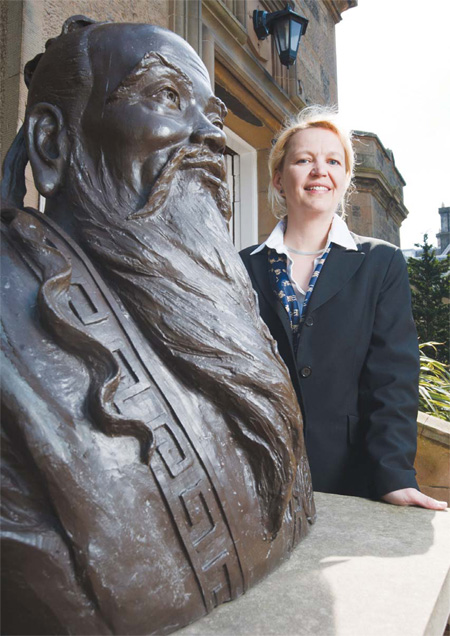Winning approach
Updated: 2011-05-06 10:45
By David Bartram (China Daily European Weekly)
Confucius Institute in Edinburgh scores with 'comprehensive' learning
Outside Abden House, a grand baronial mansion in a leafy suburb of Edinburgh, stands a statue of Huang Kuan. In 1855, Huang became the first Chinese graduate from a European university, when he was awarded a Doctor of Medicine by the University of Edinburgh. More than 150 years later, China's educational links with Europe - and in particular Scotland - have never been stronger.
The Confucius Institute for Scotland, run as a joint venture between the University of Edinburgh and Fudan University in Shanghai, is the world's exemplar. For the past four years, it has won the Confucius Institute of the Year award, last time beating competition from 322 others in 96 countries around the world.
"I think what is distinguishing us is that we take a comprehensive approach to promoting Chinese language teaching as well as culture and business education," says Natascha Gentz, director of the Confucius Institute for Scotland.
|
 Natascha Gentz, director of the Confucius Institute for Scotland, stands beside Confucius' bust at the University of Edinburgh. Maverick Photo Agency |
"Many institutes focus on one aspect. We combine the cultural events with educational, trying to inspire people to get interested in China and follow up that interest by seeking more education."
Confucius Institutes are still very much a recent phenomenon. The initiative was launched in 2004 by Hanban, also known as the Office of Chinese Language Council International. The idea was to promote the teaching of Chinese language and culture around the world by providing expert guidance and resources in partnership with local institutions, normally universities.
Following test runs in Asia, Europe's first Confucius Institute was founded in Stockholm in 2005. Andrea Pauli, a coordinator at the Stockholm Confucius Institute, has observed a remarkable growth both in the institute, and general interest in China since then.
"Our activities have grown a lot since the beginning. The first activities were more focused on language teaching, but we have expanded in recent years," Pauli says. The Stockholm Confucius Institute now hosts a wide range of lectures, seminars and conferences on different aspects of Chinese culture.
Unusually for a Confucius Institute in Europe, Stockholm's also provides academic credits for students studying Chinese at Stockholm University. The close ties to the university did attract some criticism in 2007, with claims that the institute was inhibiting academic freedom rejected by an independent assessment.
But while relations between Confucius Institutes and host universities are usually very cooperative, what does remain is the question of what a Confucius Institute offers that a standard center of Chinese studies does not.
"Confucius Institutes do a different part of the job to a university," says Lucy Zhao, deputy director of the Sheffield Confucius Institute.
"We have a school of East Asian studies that offers credit based study. The institute offers classes on a non-credit basis. If you are interested in Chinese language or Chinese culture but don't have the time to actually spend four years taking a degree, you can attend our courses."
As China becomes increasingly relevant, particularly economically, this flexible approach to Chinese teaching is growing in appeal.
"People come for all sorts of reasons," Zhao says.
"Some are interested as China gets more media exposure and they want to find out more. We have people wanting to explore business opportunities in China, or to go and work in China. Some people work for companies that require them to learn Chinese."
Outreaching to the wider community was always as the heart of the idea behind Confucius Institutes. A major part of this process is to bring China and the Chinese language to a younger audience who may not have yet experienced it. Confucius Classrooms provide a model to achieve just that, offering schools the resources, teachers and training required to teach Chinese language and culture.
"Some schools may want their children to learn Chinese, but may not be in the position to offer it themselves," says Karen Wang, deputy director at the University of Manchester Confucius Institute, one of the leading institutes for providing Chinese teaching to younger children.
"We are engaging very actively, particularly primary schools. We offer free language tasters to local schools, we send our teachers there for free. The children learn their first words of Chinese, or hear someone talking about something like Chinese New Year."
In the last year alone, around seven to eight thousand schoolchildren in the Manchester area have attended classes or activities put on by the Manchester Confucius Institute, but there are plans to expand further.
"The last couple of months we've been training primary school teachers to teach Chinese. These are all non-native speakers who are already primary school teachers. First they must learn some Chinese with us, then we provide them with resources so they can introduce even just five or 10 minutes of Chinese into lessons. Some run after school clubs."
It is hoped that by introducing children to Chinese from a young age, they will be more inclined to want to pursue the language at more advanced levels. Back in Stockholm, this approach, in support of a wider governmental initiative to encourage Chinese learning at school, seems to be working.
"I started to teach Chinese four years ago in a middle school in Stockholm," Andrea Pauli says. "Back then, there were only 14 people signing up for the course, but the next year we had 50 students and now more than 100 students are studying Chinese.
"Every semester I ask the students: 'How come you are studying Chinese?' For some of them, their parents have noticed the Chinese economy is growing and think it will be good for their future. But also many students feel it is interesting to study something new. They are attracted to this idea of a different language, a different way of writing."
Anecdotal evidence such as this is certainly encouraging for the future of Chinese language education. But while growth of Confucius Institutes around the world has been remarkable - more than 300 in the past six years, with hopes of 1,000 in operation by 2020 - quality of teaching must come ahead of quantity.
"We think about the long term sustainable development of language teaching," says George Zhang at the London Confucius Institute at SOAS.
"For instance we need qualified teachers, which are really lacking in this country as until recently there wasn't a system to train Chinese language teachers."
With Confucius Institutes spreading across Europe, from Iceland to Portugal to Belarus, Zhang recognizes that there will not be a "one size fits all" approach to improving the quality of Chinese language teaching.
"Compared with the demand we still haven't done enough. If you want effective teaching you need to understand how people learn, and that's the focus of our research. This can even include things like localized teaching material, which is made to suit the learning needs of students in a particular country.
"Whatever we do, we must make sure it fits with the local needs, otherwise there isn't going to be any demand for us at all."
E-paper

Head on
Chinese household care goods producers eye big cities, once stronghold of multinational players
Carving out a spot
Back onto center stage
The Chinese recipe
Specials

Bin Laden dead
The world's most wanted man was killed in a US raid in Pakistan.

British Royal Wedding
Full coverage of the royal wedding of Prince William and Kate Middleton in London. Best wishes

The final frontier
Xinjiang is a mysterious land of extremes that never falls to fascinate.
